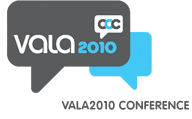 Monday 8 February, 13:30 – 14:00
Monday 8 February, 13:30 – 14:00
More and more libraries are using freely available open source APIs to add value and functionality to their existing online collections and content. An application programming interface (API) is an interface implemented by a software program to enable interaction with other software, similar to the way a user interface facilitates interaction between humans and computers.
Presenter: Paul Hagon
In his own words Paul Hagon is a web developer at the National Library of Australia. Before this he worked at the Australian War Memorial so he has acknowledged there is something he loves about working at cultural institutions. He has been playing around on the web since the days of Netscape 1.0 and has worked in the business professionally since 1999. When he’s not on the computer you can find him out running or riding. You can follow Paul’s activities here or at Flickr, Twitter or delicious..
Paul is one of the leading figures in the library mashup / API frontier in Australian. In 2010 Paul was the first Australian to be recognised by the Library Journal as a Mover and Shaker for Technical Leadership. VALA is therefore delighted Paul kindly agreed to talk to the topic of library mashups and APIs at the VALA2010 L Plate Series.
- Content from this L Plate Session will soon be made available online.

 Libraries at the network level: APIs, linked data, and cloud computing
Libraries at the network level: APIs, linked data, and cloud computing